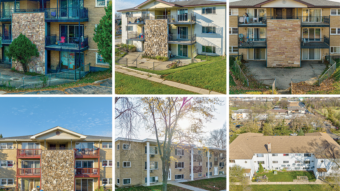A dearth of commercial construction in Chicago has been the norm for the past several years, but as the multifamily market stands to post strong gains for the foreseeable future, big name developers are once again lining up to alter the city’s skyline.
While the housing market may still be searching for its nadir, the apartment market is demonstrating strong fundamentals as rents are rising and demand is increasing. It has been enough to spark the interest of developers looking to strike while the iron is hot. Of course, as more than half a dozen developers look to finance big projects, the question remains how much money is available and just how many new units the market can support before it becomes over saturated. For those looking for capital, it recently became even tighter as Magellan Development obtained the financing to construct its eighth building on the sprawling Lakeshore East planned multifamily community.
Magellan recently broke ground on the 499-unit Coast at Lakeshore East. The firm obtained $99 million in equity finance from Northwestern Mutual Life Insurance Co. to fund the deal. Magellan and equity partner JP Morgan Asset Management have also invested $50 million into the project.
“Demand is there and supply is not keeping up with it,” says David Carlins, president of Magellan. “There has been a paradigm shift in the market.”
Carlins sites that there has been a 1 percent drop in homeownership since the housing crisis began, which puts 1.5 million more renters on the market. People are still “gun-shy” to buy and those that do want to purchase have found it difficult to obtain financing. All signs point to a strong rental market.
Investors are responding and now are beginning to look at multifamily projects as reliable plays.
“There is a flight to quality multifamily,” says Carlins. “We received quotes from six different banks and two life companies. The capital and the debt were there.”
While debt may have been available, the firm went with an equity deal as a debt structured alternative would have required multiple banks, something Carlins says “can get complicated.”
The project also had to be scaled back from its original designs.
“We are not building out the full density of the site, but we think a 499-unit building is the right size to do today,” he says. “Financing a $150 million project is easier than a $200 million project.”
Finding the right project and the proper financing route is a process that numerous firms are attempting to figure out.
It is a long and impressive list of names that are currently testing the waters for large-scale financing in a still hesitant market. Habitat Co., Fifield Cos., Optima, AMLI Residential, RMK, and Related Midwest are all shopping big apartment projects that will undoubtedly carry large prices tags. Although all are still in the planning phases, the projects would range from as low as 312 units and as high as 500, the larger number being proposed by Related Midwest at 515 Peshtigo Court. Related also recently closed on the stalled Waterview Tower project at 111 W. Wacker. The firm will redevelop the property as a 500-unit luxury apartment high-rise.
Stephen Ross, executive vice president-development for AMLI, says that his firm is currently in the permitting stage for a 49-story high-rise at Clark and Hubbard streets in the River North neighborhood.
AMLI Residential operates a subsidiary Prime Property Fund, a privately held real estate investment fund managed by Morgan Stanly Real Estate. Ross says that the project will be self-financed and could break ground as soon as September.
The 409-unit building could be partially delivered by April of 2013, says Ross.
It may be safe to assume that the majority of projects out there will not receive any financial backing, but it is likely that a few could. The fundamentals are strong enough to get the attention of lenders right now.
“For the last six months demand has been good,” says Glen Marker, senior market advisor at PPR. “We were expecting that from the state of housing market, but it has proved to be better than anticipated.”
The rental market is typically driven by 20-35-year-olds. In tough economic times, apartment numbers often suffer as many young people move back home, or, they take on roommates to help lessen costs. Marker says that this pattern did occur, but only for a very short time. Once the economy seemed somewhat stable, renting began to occur at a swift pace. As units begin to fill, landlords have seized the opportunity to raise rents.
Ron DeVries, vice president of Appraisal Research Counselors, says that rents will increase 7-9 percent in year-to-year comparisons and that demand is currently outpacing supply. The Chicago market has absorbed an average of 1,700 units each year for the past three years. With 1,000 scheduled to be delivered this year and less than that on the docket for 2012, it seems that there is room for a few more developments. However, it is a delicate balancing act and too many projects could be detrimental to the market.
Chicago is expecting 2,000-3,000 units to be delivered in 2013, with a good chunk of that coming from Magellan’s current project. Anything above the 3,000 mark could start to soften the market, says DeVries.
If a project were to get financing right now, it would most likely be for a 2014 delivery.
While the market could very likely support several new projects at that time there is one factor that hangs over the entire prospect as a wild card: the condo market.
PPR’s Marker is not entirely convinced that the market could be ready for a rush of new apartment projects. With the development time table putting any newly financed project at least two years away, new units could face competition not only from each other, but from a recovering condo market as well.
The overall rental market may traditionally be driven by a younger demographic, but the downtown market is a different story. Established professionals and empty nesters ranging from 35-60 years old make up the typical downtown dweller. In the past, many have been condo buyers rather than renters. That trend has reversed course, but that is not to say that it will last into the indefinite future.
“Established professionals are not buying condos right now, but how long does that last?” Maker says. “Once the housing market stabilizes, will that siphon off rentals downtown?”
In a recent CNNMoney survey of 27 economists, 21 predicted that home values will see a 2 percent increase in 2012. This may be very modest appreciation, but that may be all it takes to bring buyers back into the market. If the bottom will occur sometime in the next 18 months, many buyers could reenter the market in an attempt to purchase as close to the bottom as possible. With plenty of condo units available, they will have numerous options at steep discounts.
“Over the long term, I don’t think you will have a problem with condos,” says Marker. “Delivery could be dicey for rentals a few years out.”
Announced potential projects:
- Fifield Cos.-496 units at 365 N. Halsted
- Optima-325 units at NE corner of Illinois & St. Clair
- AMLI Residential-409 units at SE corner of Clark & W. Hubbard
- RMK-321 units at 73 E. Lake St.
- Related Midwest-500 units at The Peshtigo (515 N. Peshtigo Ct.)
-Source: PPR



